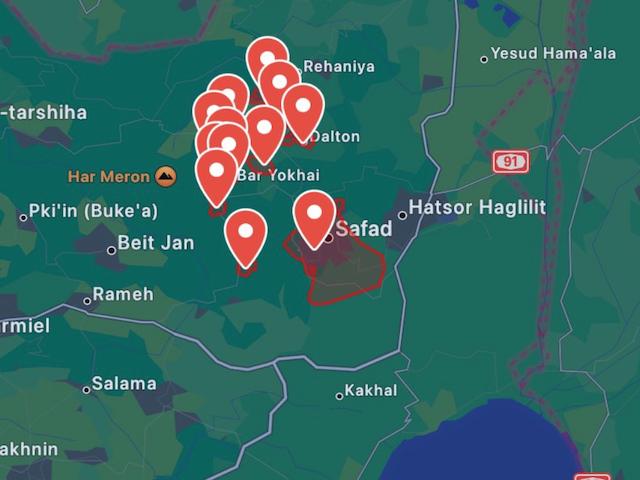In the early hours of Wednesday, the tranquility of northern Israel was shattered as a barrage of rockets launched by Hezbollah targeted several communities, marking a significant escalation in the group's offensive actions against Israeli cities. The serene landscapes of Safed, Meron, and the expanse of the Upper Western Galilee were abruptly transformed into scenes of alarm and urgency, as the wail of sirens filled the air, signaling the immediate danger to residents. At least one person has been killed according to Israeli authorities.
BREAKING:
— Visegrád 24 (@visegrad24) February 14, 2024
1 Israeli woman killed and 7 wounded after a massive rocket barrage by Hezbollah in Lebanon against the Israeli city of Safed in northern Israel.
Major escalation by Hezbollah. pic.twitter.com/p1ytcKCvML
This latest attack resulted in at least seven Israelis requiring hospitalization due to injuries sustained from the rocket fire not including the woman who had died. The medical response was swift, with Magen David Adom (MDA), Israel's national emergency medical, disaster, ambulance, and blood bank service, providing vital assistance to seven individuals. Four of these were in moderate condition, while three sustained lighter injuries. All the injured were promptly transferred to Ziv Medical Center in Safed for further treatment, highlighting the resilience and efficiency of Israel's medical response in times of crisis.
The situation prompted a stark warning from Moshe Davidovitz, head of the Mateh Asher Regional Council, who described the north of Israel as being inundated by a "flood of missiles." Davidovitz's statement was a call to action for the Israeli government, urging a wake-up to the repeated provocations by Hezbollah, particularly the Radwan Force, whose actions he metaphorically described as being dismissively regarded by Israel. His poignant message, "without security, there is no north," underscores the critical importance of security for the survival and prosperity of Israel's northern regions.
SAFED ROCKET ATTACK UPDATE
— Jewish News Syndicate (@JNS_org) February 14, 2024
One woman killed, seven wounded in Safed in Hezbollah rocket attack
DETAILS ▸ https://t.co/hN7LFdtPJ4
ONGOING pic.twitter.com/IKffwtqqIQ
This sentiment of feeling abandoned in the face of adversity is not new among the residents of Israel's north. It echoes previous frustrations voiced during the ongoing conflict with Hamas and the persistent threats from Hezbollah, suggesting a deep-seated concern for their safety and a call for more decisive action from national leaders.
Further complicating the situation, the day prior to the latest barrage saw Kiryat Shmona, a city already tense from the conflict, suffer from a direct rocket hit that wounded two individuals. This incident serves as a grim reminder of the constant threat faced by communities along Israel's northern frontier.
Amidst this escalation, Hezbollah's leader, Sayyed Hassan Nasrallah, has made clear that the group's cross-border attacks into Israel are a direct response to what he terms Israel's "aggression" in the Gaza Strip. Nasrallah's rhetoric not only threatens further displacement of residents from Israel's northern regions—a tactic that has already led to tens of thousands evacuating due to months of rocket fire—but also warns of an expansion in Hezbollah's military campaign should Israel intensify its military operations.
🚨 BREAKING: ROCKET ATTACK IN NORTHERN ISRAEL | 5 CASUALTIES REPORTED
— Mario Nawfal (@MarioNawfal) February 14, 2024
The Northern Command base in Safed, close to the Lebanon border, was hit by a rocket attack from Hezbollah.
Source: Ria News pic.twitter.com/ZSaHHvFoAF
This situation poses a critical challenge for Israel, balancing the need to protect its citizens and territory with the complexities of regional dynamics and the pursuit of lasting peace. The resilience of Israel's communities, the dedication of its emergency services, and the strategic decisions of its leaders are all being tested as they navigate these turbulent times, striving to secure a future where security and peace are not just aspirations but realities for all its citizens.


